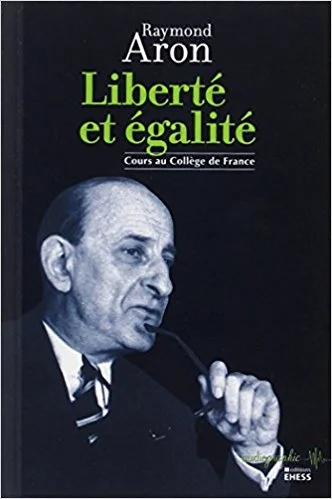LIBERTY AND EQUALITY
Raymond Aron
(Éditions EHESS, 63 pages, 2013)
Aron is the supreme destroyer, not of hopes, but of confusions and illusions.
—Stanley Hoffman, New York Review of Books
Aron scrutinized political life with indefatigable attention until his last day, because he could not retire from the place where humanity makes the test of itself.
—Pierre Manent
Raymond Aron (1903–1983) was one of France’s prominent intellectual and influential figures—a sociologist, journalist, political commentator, and, not least, an independent-minded liberal known for his fierce critique of ideological orthodoxies. In this, his final lecture at the College de France, in April of 1978, Aron concluded his long teaching career by reflecting on the nature of Western democracies and the challenges they face in reconciling their founding concepts of liberty and equality. Those challenges are as relevant today as they were at the time of this lecture, which eloquently sums up Aron’s philosophical legacy.
Raymond Aron preferred to speak of liberties rather than liberty: “We all enjoy certain liberties,” he wrote, “and we never enjoy all of the liberties.” Seventeenth- and eighteenth-century philosophers based their definitions of liberty on speculations about theories on human nature. But Aron was not interested in abstraction. Rather, he examined how liberties are actualized—or not—in specific sociological and historical contexts. Well aware that the definition of freedom has varied across space and time, Aron cautiously confined his observations to his own Western, liberal, and relatively prosperous democratic society.
In this lecture, Aron classifies liberties—political, personal, and social—in a clear and accessible manner, and discusses the ways they intersect or conflict with one another, all without losing sight of the unrelenting quest for equality. Aron sees signs of the “moral crisis of liberal democracies” in intellectual developments characterized by “the detestation of power as such.” Liberty, Aron observes, has come to be mostly understood as the liberation of individual desires. This worries him, not because he objects to individuals expressing their personality and realizing their intimate desires, but because, for him, a liberal democracy, in order to be sustainable, needs to include as it did in the past a definition of “the virtuous citizen.” In spite of these concerns, Aron reminds his audience that it is still a privilege to live in societies, how imperfect they may be, “with a deep tradition of seeking liberty in equality or equality in liberty.”
Raymond Aron was a political scientist, sociologist, and journalist who made major contributions to the study of totalitarianism, liberalism, Communism, and international relations. In 1945, he co-founded with Jean-Paul Sartre the journal Les Temps modernes; and, a year later, Combat with Albert Camus. Prolific and versatile, Aron produced thousands of journalistic columns, hundreds of essays, and many scholarly books, some of which were published posthumously and appeared in at least nine languages. Of his books translated into English, the most famous is The Opium of the Intellectuals (Norton, 1962; Routledge, 2001). Others include The Century of Total War (Praeger, 1981), Peace and War: A Theory of International Relations (Anchor Press, 1973; Routledge, 2003), Clausewitz: Philosopher of War, (Simon & Schuster, 1983), Main Currents in Sociological Thought (Routledge, 1998), The Imperial Republic: The United States and the World 1945–1973 (Little, Brown, 1974), and The Dawn of Universal History: Selected Essays from a Witness to the Twentieth Century (Basic Books, 2003). He also wrote Memoirs: Fifty Years of Political Reflection (Holmes & Meier, 1995).

